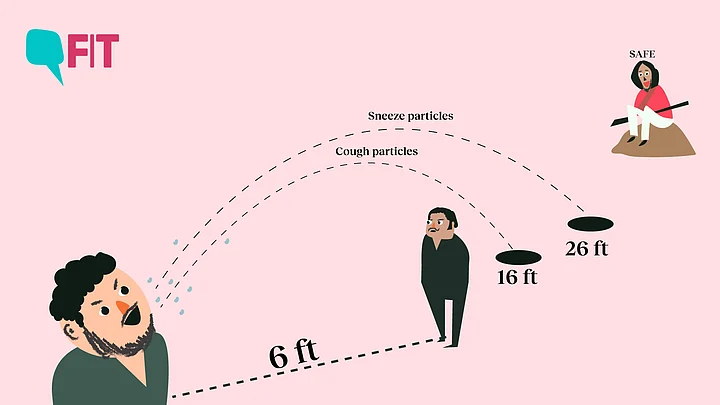As we inch closer to May 3, and the centre and state governments contemplate how to open up the country, now’s a good time to understand why the new normal may include social distancing, wearing a protective mask and frequent hand washing, even if we don’t remain in a continued lockdown.
Key to understanding this is to know how far a COVID-19 virus can travel, if you are infected and when you cough, sneeze or even just talk.
COVID-19, like the regular flu, is transmitted when a healthy person comes in contact with an infected person. An infected person can pass the virus through droplets that are produced when one coughs, sneezes or even talks.
When we cough or sneeze, we produce droplets of different sizes. The larger ones usually fall to the ground, closest surface or break into a smaller droplets. Since the larger droplets are heavier, they don’t travel as far as the smaller droplets. A 6 ft distance is considered good enough to avoid these.
The smaller droplets also known as aerosols, unlike the heavier droplets, can remain suspended in air for as long as 30 minutes. They can also travel farther than the bigger droplets.
It’s the reason why scientists and doctors have been recommending social distancing. The farther away you are from an infected person, the less likely you are to get infected. As the droplets travel, they get diluted. While a 6 feet distance is minimum that experts recommend, we maintain, it is not necessarily always effective.
It’s not just sneezing and coughing, but even droplets that come out of your mouth when you speak, can transmit the infection. This is especially problematic if a person is infected and asymptomatic. According to scientists, an infected person, in a poorly ventilated room can produce as many viral droplets as a cough can.
So, while social distancing is important, that alone is not the most effective protection against COVID-19.
To increase the chances of fighting COVID-19, even if and when the lockdown is eased is to follow these rules together - maintain social distancing, wear a protective mask and wash your hands frequently.
Wearing a face mask, even a DIY one, helps. They can prevent large droplets from landing on the nose and mouth. It also stops you from touching your face. If you are infected, chances of you passing on the infection reduces. But masks alone are not the answer, because it doesn’t stop you inhaling droplets.
Wash your hands as often as possible, because the virus spreads if you touch an infected surface, from counters to phones and tabs, and then your face. Remember the larger droplets, that often settle on nearby surfaces? Wash your hands frequently to reduce the transmission of virus.
And finally, follow social distancing norms, along with wearing masks and washing hands. 6 feet is an ideal distance to maintain, especially when in a public place. It protects you from getting infected, and if you are already COVID-19 positive, you can keep others safe, by maintaining distance.
(At The Quint, we question everything. Play an active role in shaping our journalism by becoming a member today.)
